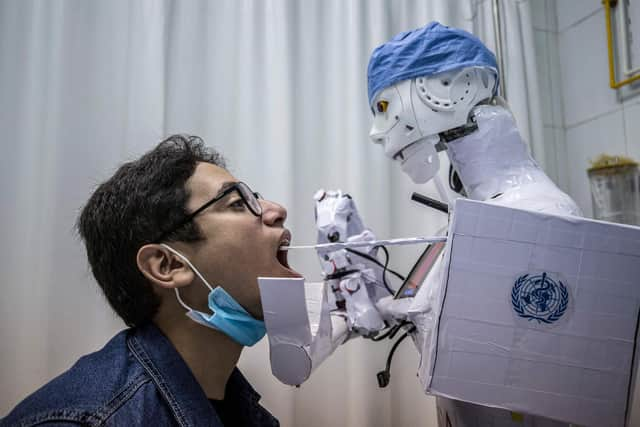ChatGPT: Humanity may be safe from rise of AI bots for now, but they’re starting to get scary – Alastair GJ Stewart
ChatGPT is an artificial intelligence chatbot developed by OpenAI and launched in November 2022. The model has been trained on extensive text data, generating human-like responses to various questions and prompts. Its replies are based on a large body of text from multiple sources, including Wikipedia, books, news articles, and scientific journals.
The system has none of the lame chatbot functionality of utility websites. I asked it to write me 950 words on Star Trek Picard's third season, and it produced it within 15 seconds. It did the same when asked to summarise the Scottish independence movement, and eerily generated a 1,000-word history of its own genesis. All while interacting conversationally.
Advertisement
Hide AdAdvertisement
Hide AdMost writing is about collating information and producing an argument and a verdict. Suppose that can be done within seconds with an instruction specifying the final opinion beforehand. In that case, many traditional and dot-com industries will suffer a crisis not seen since the advent of the Industrial Revolution. The implication is radical, not least to journalism, copywriting, PR and any industry required to create lengthy opinions and extensive amounts of copy.
Philosophers have spent millennia debating epistemology and ontological, spiritual and ethical definitions of humanity. It is a common theme in science fiction to ponder when a perfect robot replica of a human being becomes real if it can do all the same things (often at greater speeds and efficiency). However both fiction and fantasy agree there is a spark of human creativity which has yet to be reproduced.
The next question is even more of a headache when AI can produce art and poetry: what is art, and when does extrapolation become innovation and even beautiful? Can art only come from human hands and minds?
This is not some esoteric nonsense. How we define the output of machines which can rival the quality and productiveness of a human will affect livelihoods. Suppose AI can produce copy for newspapers that accurately relays facts; journalism as a trade could be redefined. Plagiarism will become a nightmare for academic assessors, to say nothing of the misery of political propaganda churned out by automated and calculated social media functions.
There are already examples of AI systems being used to create fake news, launch cyber attacks, manipulate information, impersonate individuals and carry out phishing attacks. The list is ubiquitous and complex. We must prepare tough regulatory frameworks to address what will quickly become a problem in every traditional sector, including manufacturing, law, medicine and services.


AI, which could progress to the stage of human interaction in professional settings like shops where some automation already exists, may radically alter the landscape of the hospitality and customer service sectors. Personalised, adaptive automation, which you could interact with, would be an extension of self-service technology already in place.
The cultural challenge begins now with predictive chatbots that can write long essays and produce amusing pictures and poems. ChatGBT is the best well-known AI functionality. Adverts are already appearing for 100 other alternatives.
We can all list the dangers of any technology which enables impersonation and duplication. That is as old an argument as when schools debated if calculators diminished or helped students, and if spell checks were making people stupid. Most universities still mandate examinations are written instead of typed (with only students requiring special assistance allowed to use a laptop). Advanced writing programmes can recommend complex syntax and style changes to pieces tailored to audiences.
Advertisement
Hide AdAdvertisement
Hide AdBut there is a massive difference between advisory programmes and software which does the creative legwork for you. At present, the technology is a glorified rehash. It can draw on available information and imitate an answer but cannot produce pure innovation. It is incapable of pioneering research, indulging innuendo, and subtle inferences. The dataset on which ChatGPT relies only went up to 2021, meaning it needs more information on recent events. The text might be original, but without the researcher's edge, it will never compete with humans in pure style.
Imitation is the sincerest form of flattery, and for now, AI is a faux designer handbag and a well-copied essay with words switched around. It is enjoying that flash-in-the-pan moment of being a fantastic tool which enhances human potential without replacing the essence of what makes us original, particularly in the arts and entertainment industries.
When I worked at a bookshop, my colleague and I debated the sheer abundance of “guff” on the shelves. You can mass produce as much as you wish, but it still takes a discerning eye and human criticism – an industry in itself – to weigh the quality of something in its broader context. The same is true of movies. Every week some new explosion of nonsense is presented to us – availability and proliferation are no guarantee of a warm reception, and it is unlikely the same old rehashed idea will be hailed as a magnum opus.
Until machines can genuinely mimic the spark of creation, make errors in plot and pacing and commit fallacies from ego, vanity, and bias in their arguments, humanity is not done yet. But between here and that point, innumerable services, so enriched by essential human-to-human interaction, will face an unprecedented attack.
This should be a cause of reflection for us all: seldom has any tremendous technological leap forward come without a titanic human cost. “Computers,” noted Mr Spock of Star Trek, “make excellent and efficient servants, but I have no wish to serve under them.”
Comments
Want to join the conversation? Please or to comment on this article.